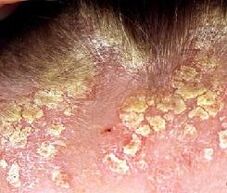
One of the most common forms of the disease is scalp psoriasis.
The disease itself is not an infectious process, but, nevertheless, the disease persists in an inflammatory nature.
The symptoms of psoriasis are very typical for fungal diseases - red or pink spots on the head, which have different shapes.
In addition to the formation of a single or multiple rashes, itching, burning and inflammation appear on the skin.
Causes of psoriasis
Why does psoriasis of the head occur, and what is it? Doctors still do not know why some people develop scalp psoriasis. Doctors periodically put forward new theories and refute old theories. The causes of the development of this disease are often associated with genetic predisposition, and the factors that cause their appearance include:
- Genetic burden - it has been proven that in parents with psoriasis, the likelihood of having a child with this diagnosis is an order of magnitude higher.
- Violation of the formation and maturation of epidermal cells, according to one hypothesis, is the main cause of the development of the disease.
- There is also the assumption that the cause is not in the epidermis, but in the body’s immunity, which produces the wrong factors that negatively affect the skin.
- Disorders in the endocrine system, according to some scientists, also contribute to the development of the disease.
The most likely cause of the development of psoriasis today is considered to be an autoimmune process in the body of a sick person.
Is your hair falling out?
Often patients suffering from the disease are interested in the question - can hair loss be observed in psoriasis? It should be noted that massive baldness does not occur. If such a process occurs, then in insignificant amounts, because the hair follicles are deep and the disease does not affect them.
Is psoriasis contagious?
This fear is associated with the unusual appearance of psoriasis and its history. In ancient times, psoriasis was mistakenly considered a form of terrible leprosy. From the above reasons for the appearance of psoriasis, it is clear that the disease should not fall under the infectious category. Therefore, the answer to the question of whether it is possible to be infected with psoriasis is one - no.
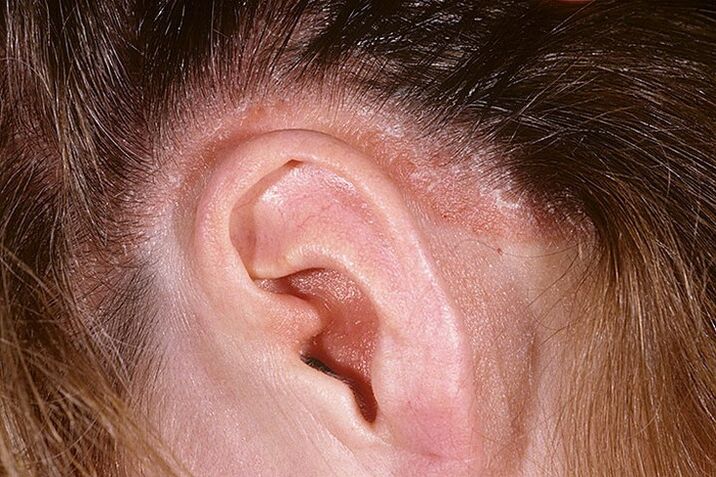
symptoms
Scalp psoriasis is accompanied by the appearance of a characteristic rash on the skin, represented by spots or, more often, plaques from pale pink to reddish-brown. In most cases, the elements of the rash infiltrate from a minimal significant height above the level of healthy skin to a significant infiltration exceeding 1 mm.
In the early stages, only diffuse, without manifestations of inflammation and obvious boundaries, copious exfoliation in the form of dandruff is possible. It is very similar to other dermatoses of the head, which greatly complicates the differential diagnosis and treatment of psoriasis of the head.
The most typical symptom for psoriasis is the "psoriatic crown" - the transition of the process from the scalp to the smooth skin of the area adjacent to the forehead, to the area above and behind the ears, to the posterior surface of the earlobe, occipital area and back of the neck.
Depending on the area and severity of the symptoms, there are 3 degrees of damage to the scalp:
- Easy- its main manifestation is the appearance on the head of a small single lesion covered with small thin scales;
- heavy- psoriasis affects the scalp completely, the size of the scales is much larger, and they are thicker than with mild disease severity.
Clinical studies show that in most patients, no single factor can be identified that can explain the onset of the disease. Often, a combination of several of these causes is observed, which provides a reason to classify psoriasis as a polyethological disease.
The difference between psoriasis and seborrheic dermatitis
Differential diagnostic signs of psoriasis and seborrheic dermatitis:
- Psoriasis, in contrast to diabetes mellitus, is characterized by more pronounced infiltration of rash elements due to acanthosis and epidermal hyperproliferation.
- The rash in psoriasis often extends beyond the scalp, to the forehead (called a "psoriatic crown"), to the neck, ears.
- Exfoliate with dry psoriasis, with diabetes more oily scales.
- More pronounced itching is observed with diabetes.
It is also necessary to carefully examine and question the patient for damage to the nails and joints, the presence of which may be in favor of psoriasis and significantly affect the tactics of further therapy.
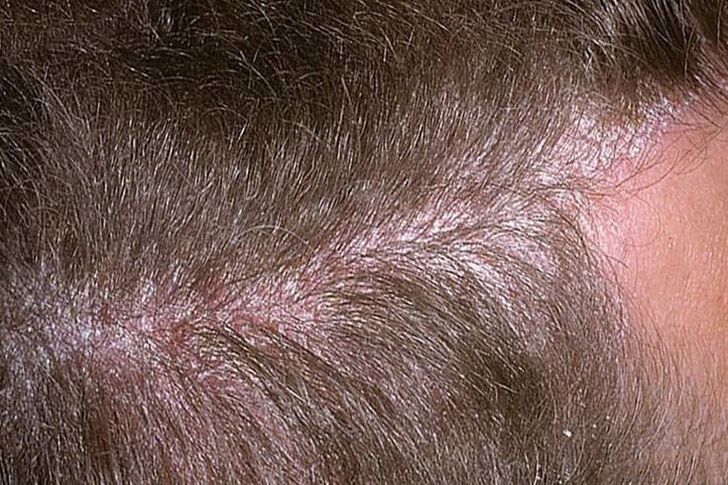
Treatment of scalp psoriasis
When scalp psoriasis is diagnosed, a set of measures are used for treatment, including:
- general therapy;
- local treatment;
- physiotherapy procedures;
- Spa treatments.
In mild cases of scalp psoriasis and the absence of development, in most cases, it is sufficient to prescribe local remedies for treatment - shampoos, gels, ointments, tar, etc. At the same time, the therapy of ever -progressive inflammatory processes may require the use of a wider range of pharmacological weapons from various groups and physiotherapeutic techniques.
How to treat psoriasis with medication?
In the general therapy complex, the doctor may include the following drugs:
- Complex of vitamins and vitamins C, A and group B;
- Nonspecific immunotherapy drugs: ATP, Aloe;
- Aromatic retinoids;
- Cytostatic;
- Hemodez solution;
- Enterosorben;
- Monoclonal antibodies;
- Imunodulator;
- Antihistamines;
- NVPS;
- Sedatives;
- Autologous blood is calcified.
The inclusion of corticosteroid and cytostatic medications in the course of treatment is advised in severe psoriasis and significant symptom severity on the scalp. They must be used with caution: such funds can trigger the severity of the disease.
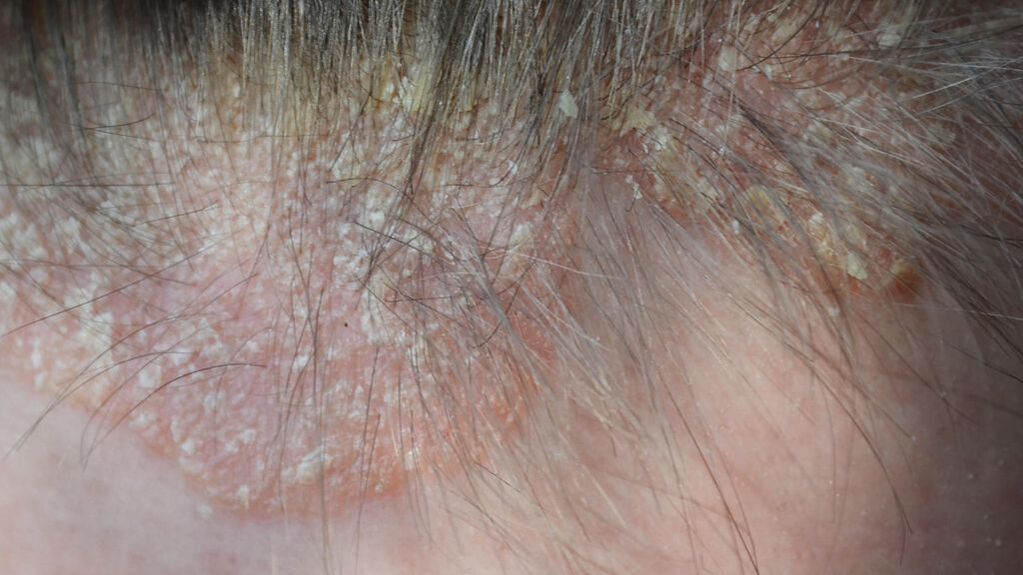
Shampoo for scalp psoriasis
Is it possible to cure psoriasis on the scalp with shampoo? As a rule, using a highly effective shampoo is not enough. However, the use of special healing agents in complex therapy is a prerequisite for the success of treatment.
All medical shampoos help reduce the inflammatory process, relieve or reduce itching, but the use of only one shampoo is ineffective - treatment must be comprehensive.
ointment
Local treatment always helps to increase the effectiveness of the drug. In progressive stages of psoriasis, salicylic ointment and 2% boron-salidol will be useful. If there is an exudative component and severe inflammation, then the appointment of creams and ointments with corticosteroids will be required.
Non -hormonal ointments contain birch, pine, juniper and coal tar. They can be produced as an ointment and as a paste.
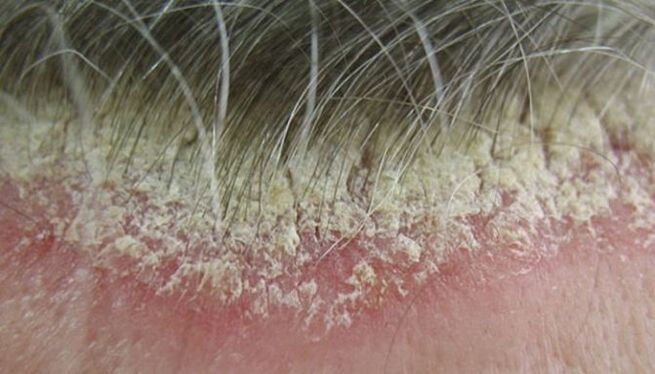
Diet for psoriasis of the head
The diet should be uniform. Portions of food should be small, based on "better less, but more often. " The last meal should be no later than 19-00, at night it is allowed to drink a glass of kefir or yogurt.
- It is necessary to completely abandon alcoholic beverages. Its use during the remission period can trigger deterioration.
- Fatty, spicy and smoked foods should be excluded from the diet.
- Sweets are also not recommended - cakes, pastries, chocolate, sugar - all of which should be banned for psoriasis. Only a small quantity of honey is allowed.
From drinks, tea with sea buckthorn, rose hips or black currant leaves will be useful.
Spa treatments
While staying in the hospital, you must attend the following procedures:
- heliototherapy;
- mud therapy;
- hydrogen sulfide bath and bath in hydrogen sulfide springs.
Courses of treatment are carried out in special sanatoriums, they help reduce the frequency of relapses and achieve long -term remission.
PUVA therapy
PUVA therapy is a method of physiotherapeutic treatment that includes the use of photoactive drugs and irradiation of the skin with long -wave UV radiation.
Relatively long experience of use and expert reviews prove the effectiveness of PUVA therapy in the treatment of various dermatological diseases (including psoriasis), especially in the case of a continuous course and with the ineffectiveness of other therapeutic methods. According to statistics, a positive effect is achieved in about 80-85% of cases.
Hair care rules
To achieve better condition of hair and scalp, you need to adhere to the basic rules of care, as well as recommendations from the doctor:
- Wash your hair only with the special shampoo recommended.
- Comb the hair with a natural bristle comb.
- Treat the scalp systematically with a disinfectant mixture.
- Comb your hair very gently, gently, without injuring the scalp.
- Try to dry your hair naturally without using a hair dryer.
- With psoriasis of the head, you need to avoid complex styling that requires the use of a variety of styling products.























